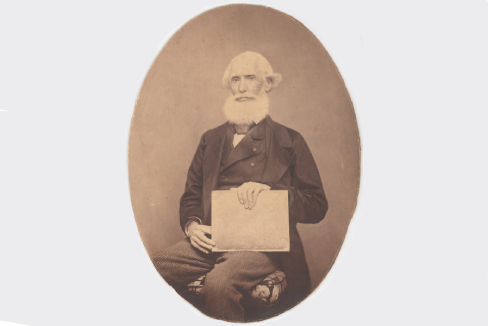About the George Finlay Papers

The George Finlay Papers contain materials created by and related to the British Historian and Philhellene George Finlay, his father John Finlay, Greek-American Philhellene George Jarvis, and British Philhellene Captain Frank Abney Hastings, dating from 1791 to 1949. Most of the collection consists of George Finlay’s meticulous records of his travels, personal and official correspondence, his personal expenditures, copious memoranda on strategy and on military and political organisation, journal entries, maps, facetiae, scrapbooks, personal notes on people—Greeks and others—and on revolutionary events, newspaper cuttings mainly on Greece and international affairs, as well as Finlay’s original manuscripts of the History of the Greek Revolution (1861) as well as corrected proofs of Finlay’s other published works.
Also included are the papers of Finlay’s father, John, two journals of Greek American philhellene, George Jarvis, and those of Finlay’s fellow British philhellene, Captain Frank Abney Hastings. The Hastings papers, which Finlay purchased in 1830, include personal and official correspondence, ship’s logs, notes that he took on board or ashore, as well as memoranda on strategy and on the naval organisation of the revolutionary forces. Collectively, these records reveal a great deal about the character, motivations, ideas, as well as the military and political judgements of these British individuals, as well as of many others, both British and Greek, with whom they interacted during the Greek War of Independence as well as many of Finlay's other interests, such as Classical and Byzantine history, natural history and politics.
News clipping on Paris exhibition 1855, The Morning Advertiser, 22 Apr 1854 (previously loose in Official Catalogue of the Great Exhibition . . ., London, 1851).
News clipping on publication of catalogue for Exhibition of 1851 (previously loose in Official Catalogue of the Great Exhibition . . ., London, 1851).
Personal advertisements section, The Times, 1984 (previously loose in Official Catalogue of the Great Exhibition . . ., London, 1851,).
William Mure to George Finlay. n.d. re visit to Prokesch and Gordon (previously attached to front flyleaf of William Mure, Journal of a Tour in Greece . . ., vol. l, London, 1842). Visiting card of Col. Mure pasted on front pastedown.
William Mure to George Finlay. n.d. Apologies for altering date of meeting with George Finlay (attached to front flyleaf of William Mure, Journal of a Tour in Greece . . ., vol. l , London, 1842). Visiting card of Col. Mure pasted on front pastedown.
Robert G. Watson to George Finlay. n.d. Thanks for loan of book (previously attached to front flyleaf of F. R. Chesney, Expedition . . ., vol. l , London, 1850).
Georg-Christian Gropius to Mrs. Finlay n.d. Invitation to her, with George Finlay and Miss Groot [? Grocott], to meet at Mme Prokesch's house that evening (in French, stuck on front flyleaf of W. R. Wilde, Narrative of a Voyage . . ., vol. 2, Dublin, 1840).
Ludwig Ross to George Finlay. 13 December n.y. Regrets illness prevents acceptance of invitation, and requests loan of Spon and Guillet (in French, stuck on front flyleaf of L. R., Reisen auf den griechischen Inseln . . ., vol. l, Stuttgart, 1840).
Newspaper clipping on discovery of a catacomb on island of Milos (stuck on front flyleaf of L. R., Reisen auf den griechischen Inseln . . ., vol. l, Stuttgart, 1840).
Mrs. C. Lenormant to George Finlay. n.d. Visiting card with compliments of the deceased author's wife (stuck on front flyleaf of C. L., Commentaire sur le Cratyle de Platon, Athens, 1861).
Mrs. C. Lenormant to George Finlay. n.d. Note with compliments of the deceased author's wife(stuck on front flyleaf of C. L., Commentaire sur le Cratyle de Platon, Athens, 1861).
Miss F. Lenormant to George Finlay. n.d. Note with compliments of the deceased author's daughter (stuck on front flyleaf of C. L., Commentaire sur le Cratyle de Platon, Athens, 1861).
James Skene to George Finlay. n.d. Asks for loan of Arundell, Asia Minor. (Loose in front of A. Forbiger, Handbuch der alten Geographie, vol. 1, Lepizig, 1842.)
James Skene to George Finlay. n.d. Returns Arundell, Asia Minor. (Loose in front of A. Forbiger, Handbuch der alten Geographie, vol. 1, Lepizig, 1842.)
Carl Boetticher to George Finlay, Athens. Berlin, 1 July 1862. Thanks George Finlay for hospitality; his archaeological work; he is not persona grata to the Athenians. (in French; previously loose in front of C. Boetticher, Der Baumkultus der Hellenen, Berlin, 1856).
G. Werthern to George Finlay. n.d. Invitation to meet German archaeologists (in French; previously loose in front of C. Boetticher, Der Baumkultus der Hellenen, Berlin, 1856).
General Sir Richard Church to George Finlay. n.d. Asks if he may delay return of book on Dacia lent by George Finlay (stuck on front flyleaf of J. A. Vaillant, La Romanie . . ., Paris 1844+loose newspaper cuttings).
News clippings on 'Turkey' (1858), 'The Servian Insurrection and the Hungarian Government of 1848-9' (The Times, 27 November 1851), and untitled undated clipping on 'the state of the Danubian provinces now under Austrian domination.' (found loose in J. A. Vaillant, La Romanie . . ., Paris 1844+loose newspaper cuttings).
Millingen's itinerary from Smyrna to Kiutaya, with newspaper cutting 'Turkey in Asia' from our own correspondent [on Erzerum] (previously loose in front of H. Kiepert, Memoir über die Construction der Karte von Kleinasien . . ., Berlin, 1854).
Rudolph Rohrer to George Finlay. n.d. Visiting card with note asking for payment of bill (in German, stuck on front flyleaf of Aristotelis Categoriae . . ., Leipzig, 1832).
Paul Lambros to George Finlay ? n.d. Memoir on Byzantine gold coins of Philippi (stuck on back flyleaf of M. Pinder and J. Friedlander, Die Münzen Justinians, Berlin, 1843).
Draft letter by George Finlay describing his collection of Byzantine coins, No date. (loose in M. Pinder and J. Friedlander, Die Munzen Justinians, Berlin, 1843).
Newspaper clipping on gold coins of Philippi. In Greek. (loose in M. Pinder and J. Friedlander, Die Munzen Justinians, Berlin, 1843).
Antonios Miaoulis to George Finlay. n.d. Concerning dispatch of a letter (in German, stuck on front flyleaf of P. K., Ἡ νῆσος τῶν Σπετσῶν [1850]; bound in with A. Miaoulis, Ὑπόμνημα περὶ τῆς νήσου Ὓδρας, Munich, 1834).
Wood to George Finlay. Hotel de la Grande Bretagne, Athens, n.d. Desires to visit George Finlay's collection of antiquities (stuck on front flyleafof S. Birch, History of Ancient Pottery, vol. i, London, 1858). Also pasted at front: cuttings from Elite des Monuments Ceramographiques by Ch. Lenormant. Also added: The British Museum: A Guide to the First Vase Room, London, 1866.
Nicolaos Dragoumis to George Finlay. n.d. Comments on George Finlay's views on payment of deputies; discusses Greek Chambers and position of the king (in French, stuck on back flyleaf of N. D., Ἱστορικαὶ Ἀναμνήσεις, 2nd edn., vol. 1, Athens, 1879).
Alexander M. Apostolides to George Finlay. 28 June, n.y. Sends George Finlay copies of article on the killing of Greek patriots (in French, stuck on front flyleaf of Ἐφημερὶς τῆς κυβερνήσεως τοῦ Βασιλείου τῆς Ἐλλάδος, Regierungs-Blatt des Koenigreichs Griechenland, January 1835).
Handwritten itineraries by George Finlay bound in William Gell, The ltinerary of Greece . . ., London, 1819, pp. 317 ff.
Ludwig Ross to George Finlay. n.d. Requests loan of E. L. Bulwer on Athens and the Athenians (previously stuck on front flyleaf of E. L. B., Athens and its Rise and Fall . . ., London, 1837).
Visiting card of Mr Bulwer-Lytton (previously loose in E. L. B., Athens and its Rise and Fall . . ., London, 1837).


